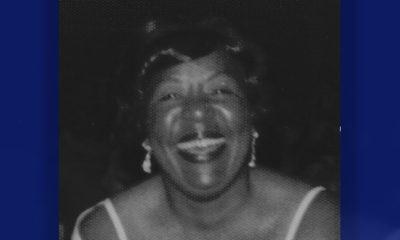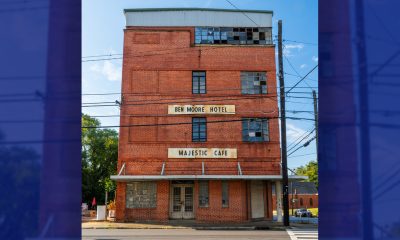Black History
Fight Continues to Install Plaque Memorializing Madison County Lynchings
THE TENNESSEE TRIBUNE — The Jackson Madison County Community Remembrance Project will continue trying to install a plaque that would memorialize three lynchings which took place in the late 1800s in Madison County. The JMCCRP is a partnership with the Equal Justice Initiative that consists of Madison County and Jackson citizens. The coalition is focused currently on installing the plaque, despite the plaque having been voted down at a Madison County Commission meeting in June.
By Malorie Paine
JACKSON, TN — The Jackson Madison County Community Remembrance Project will continue trying to install a plaque that would memorialize three lynchings which took place in the late 1800s in Madison County.
The JMCCRP is a partnership with the Equal Justice Initiative that consists of Madison County and Jackson citizens. The coalition is focused currently on installing the plaque, despite the plaque having been voted down at a Madison County Commission meeting in June.
The plaque would provide information about the three known people and the events that took place on one side of the plaque, and on the other side, there would be information about lynchings that took place throughout America.
Dr. Cindy Boyles, JMCCRP project manager, said the plaque is meant to draw attention to the events so that others may research the events. The lynchings took place without due process, and it’s important to talk about that, Boyles said.
“It impacts us today,” Boyles said. “In the United States, we’ve remained very silent about the impacts of slavery, the end of the Civil War, lynching and the Civil Rights Movement. Our silence really hasn’t worked for us. We may not have lynchings today, but we can clearly see the impacts of the lack of due process through mass incarcerations that we have today.”
Talking and learning about the events are the first step in the healing process, Boyles said.
“We tried to say if we don’t talk about it and we don’t look at it, and we put it under the rug, everything will get better, but everything has not gotten better,” Boyles said. “We still see racial divides between people, we still see economic and racial disparities between whites and African Americans and other minorities. If keeping quiet had worked, we really shouldn’t see any racial and economic disparity.”
The plaque would be funded through the EJI, Boyles said. This is part of a movement taking place across the South and other areas of the county, she said.
Dr. Liz Mayo, another JMCCRP member, said she was disappointed but not surprised that the Madison County Commission had voted against the installation at the County Courthouse. However, she feels the plaque is an important step in moving forward. Mayo said she was born and raised in West Tennessee, but did not learn about the lynchings that had taken place in Madison County until she was in graduate school at The University of Memphis.
“I’m a native West Tennessean, born and bred in this area, and this was not part of my K12 education,” Mayo said. “I wondered why did I not learn this when I was growing up. Why did it take me until graduate school to find this out?”
Mayo is an educator and says she makes it a point to talk about the history in her own classroom.
“Students still in the South are not learning about the true history of what happened with lynch mobs in this region,” she said.
The plaque is important not just for remembrance but as a sort of recompense of the past to make amends, Mayo said.
“It’s also really powerful to say to someone ‘This happened to you, and I recognize it. We’re not going to bury it anymore and pretend it didn’t happen to your ancestors,” Mayo said.
Mayo believes it is her responsibility to acknowledge the past and work to change to future. She feels the historical plaque would be one way to begin that process.
“There’s a form of cultural gas lighting that occurs when we try to tell someone that racism is in the past and that it doesn’t matter anymore,” Mayo said. “Instead of doing that, if we own and say ‘You know what, my ancestors were awful to your ancestors, and I’m sorry for that. Even if I didn’t personally do it, I’m still benefitting from those things that occurred during those times and places that have kept underrepresented minorities down and have given me a leg up.’”
Mayo wants to see all people work together to change the trajectory of the future and move towards a less racist society through acknowledging and dealing with the past.
The JMCCRP will work to determine other locations in Madison County that would also be appropriate for the historical plaque.
This article originally appeared in The Tennessee Tribune.
Activism
Oakland Post: Week of December 24 – 30, 2025
The printed Weekly Edition of the Oakland Post: Week of – December 24 – 30, 2025

To enlarge your view of this issue, use the slider, magnifying glass icon or full page icon in the lower right corner of the browser window.
Alameda County
Bling It On: Holiday Lights Brighten Dark Nights All Around the Bay
On the block where I grew up in the 1960s, it was an unwritten agreement among the owners of those row homes to put up holiday lights: around the front window and door, along the porch banister, etc. Some put the Christmas tree in the window, and you could see it through the open slats of the blinds.

By Wanda Ravernell
I have always liked Christmas lights.
From my desk at my front window, I feel a quiet joy when the lights on the house across the street come on just as night falls.
On the block where I grew up in the 1960s, it was an unwritten agreement among the owners of those row homes to put up holiday lights: around the front window and door, along the porch banister, etc. Some put the Christmas tree in the window, and you could see it through the open slats of the blinds.
My father, the renegade of the block, made no effort with lights, so my mother hung a wreath with two bells in the window. Just enough to let you know someone was at home.
Two doors down was a different story. Mr. King, the overachiever of the block, went all out for Christmas: The tree in the window, the lights along the roof and a Santa on his sleigh on the porch roof.
There are a few ‘Mr. Kings’ in my neighborhood.
In particular is the gentleman down the street. For Halloween, they erected a 10-foot skeleton in the yard, placed ‘shrunken heads’ on fence poles, pumpkins on steps and swooping bat wings from the porch roof. They have not held back for Christmas.
The skeleton stayed up this year, this time swathed in lights, as is every other inch of the house front. It is a light show that rivals the one in the old Wanamaker’s department store in Philadelphia.
I would hate to see their light bill…
As the shortest day of the year approaches, make Mr. King’s spirit happy and get out and see the lights in your own neighborhood, shopping plazas and merchant areas.
Here are some places recommended by 510 Families and Johnny FunCheap.
Oakland
Oakland’s Temple Hill Holiday Lights and Gardens is the place to go for a drive-by or a leisurely stroll for a religious holiday experience. Wear a jacket, because it’s chilly outside the Church of Jesus Christ of Latter-day Saints, at 4220 Lincoln Ave., particularly after dark. The gardens are open all day from 9 a.m. to 9 p.m. with the lights on from dusk until closing.
Alameda
Just across the High Street Bridge from Oakland, you’ll find Christmas Tree Lane in Alameda.
On Thompson Avenue between High Street and Fernside drive, displays range from classic trees and blow-ups to a comedic response to the film “The Nightmare Before Christmas.” Lights turn on at dusk and can be seen through the first week in January.
Berkeley
The Fourth Street business district from University Avenue to Virginia Street in Berkeley comes alive with lights beginning at 5 p.m. through Jan. 1, 2026.
There’s also a display at one house at 928 Arlington St., and, for children, the Tilden Park Carousel Winter Wonderland runs through Jan. 4, 2026. Closed Christmas Day. For more information and tickets, call (510) 559-1004.
Richmond
The Sundar Shadi Holiday Display, featuring a recreation of the town of Bethlehem with life-size figures, is open through Dec. 26 at 7501 Moeser Lane in El Cerrito.
Marin County
In Marin, the go-to spot for ‘oohs and ahhs’ is the Holiday Light Spectacular from 4-9 p.m. through Jan. 4, 2026, at Marin Center Fairgrounds at 10 Ave of the Flags in San Rafael through Jan. 4. Displays dazzle, with lighted walkways and activities almost daily. For more info, go to: www.marincounty.gov/departments/cultural-services/department-sponsored-events/holiday-light-spectacular
The arches at Marin County Civic Center at 3501 Civic Center Dr. will also be illuminated nightly.
San Francisco
Look for light installations in Golden Gate Park, chocolate and cheer at Ghirardelli Square, and downtown, the ice rink in Union Square and the holiday tree in Civic Center Plaza are enchanting spots day and night. For neighborhoods, you can’t beat the streets in Noe Valley, Pacific Heights, and Bernal Heights. For glee and over-the-top glitz there’s the Castro, particularly at 68 Castro Street.
Livermore
The winner of the 2024 Great Light Flight award, Deacon Dave has set up his display with a group of creative volunteers at 352 Hillcrest Avenue since 1982. See it through Jan. 1, 2026. For more info, go to https://www.casadelpomba.com
Fremont
Crippsmas Place is a community of over 90 decorated homes with candy canes passed out nightly through Dec. 31. A tradition since 1967, the event features visits by Mr. and Mrs. Claus on Dec. 18 and Dec. 23 and entertainment by the Tri-M Honor Society at 6 p.m. on Dec. 22. Chrippsmas Place is located on: Cripps Place, Asquith Place, Nicolet Court, Wellington Place, Perkins Street, and the stretch of Nicolet Avenue between Gibraltar Drive and Perkins Street.
Activism
Lu Lu’s House is Not Just Toying Around with the Community
Wilson and Lambert will be partnering with Mayor Barbara Lee on a toy giveaway on Dec. 20. Young people, like Dremont Wilkes, age 15, will help give away toys and encourage young people to stay in school and out of trouble. Wilkes wants to go to college and become a specialist in financial aid. Sports agent Aaron Goodwin has committed to giving all eight young people from Lu Lu’s House a fully paid free ride to college, provided they keep a 3.0 grade point average and continue the program. Lu Lu’s House is not toying around.

Special to the Post
Lu Lu’s House is a 501c3 organization based in Oakland, founded by Mr. Zirl Wilson and Mr. Tracy Lambert, both previously incarcerated. After their release from jail, they wanted to change things for the better in the community — and wow, have they done that!
The duo developed housing for previously incarcerated people, calling it “Lu Lu’s House,” after Wilson’s wonderful wife. At a time when many young people were robbing, looting, and involved in shootings, Wilson and Lambert took it upon themselves to risk their lives to engage young gang members and teach them about nonviolence, safety, cleanliness, business, education, and the importance of health and longevity.
Lambert sold hats and T-shirts at the Eastmont Mall and was visited by his friend Wilson. At the mall, they witnessed gangs of young people running into the stores, stealing whatever they could get their hands on and then rushing out. Wilson tried to stop them after numerous robberies and finally called the police, who Wilson said, “did not respond.” Having been incarcerated previously, they realized that if the young people were allowed to continue to rob the stores, they could receive multiple criminal counts, which would take their case from misdemeanors to felonies, resulting in incarceration.

Lu Lu’s House traveled to Los Angeles and obtained more than 500 toys
for a Dec. 20 giveaway in partnership with Oakland Mayor Barbara
Lee. Courtesy Oakland Private Industry,
Wilson took it upon himself to follow the young people home and when he arrived at their subsidized homes, he realized the importance of trying to save the young people from violence, drug addiction, lack of self-worth, and incarceration — as well as their families from losing subsidized housing. Lambert and Wilson explained to the young men and women, ages 13-17, that there were positive options which might allow them to make money legally and stay out of jail. Wilson and Lambert decided to teach them how to wash cars and they opened a car wash in East Oakland. Oakland’s Initiative, “Keep the town clean,” involved the young people from Lu Lu’s House participating in more than eight cleanup sessions throughout Oakland. To assist with their infrastructure, Lu Lu’s House has partnered with Oakland’s Private Industry Council.
For the Christmas season, Lu Lu’s House and reformed young people (who were previously robbed) will continue to give back.
Lu Lu’s House traveled to Los Angeles and obtained more than 500 toys.
Wilson and Lambert will be partnering with Mayor Barbara Lee on a toy giveaway on Dec. 20. Young people, like Dremont Wilkes, age 15, will help give away toys and encourage young people to stay in school and out of trouble. Wilkes wants to go to college and become a specialist in financial aid. Sports agent Aaron Goodwin has committed to giving all eight young people from Lu Lu’s House a fully paid free ride to college, provided they keep a 3.0 grade point average and continue the program. Lu Lu’s House is not toying around.
-

 #NNPA BlackPress4 weeks ago
#NNPA BlackPress4 weeks agoLIHEAP Funds Released After Weeks of Delay as States and the District Rush to Protect Households from the Cold
-

 Activism4 weeks ago
Activism4 weeks agoOakland Post: Week of November 26 – December 2, 2025
-

 Alameda County3 weeks ago
Alameda County3 weeks agoSeth Curry Makes Impressive Debut with the Golden State Warriors
-

 #NNPA BlackPress4 weeks ago
#NNPA BlackPress4 weeks agoSeven Steps to Help Your Child Build Meaningful Connections
-

 #NNPA BlackPress4 weeks ago
#NNPA BlackPress4 weeks agoSeven Steps to Help Your Child Build Meaningful Connections
-

 #NNPA BlackPress4 weeks ago
#NNPA BlackPress4 weeks agoTrinidad and Tobago – Prime Minister Confirms U.S. Marines Working on Tobago Radar System
-

 #NNPA BlackPress4 weeks ago
#NNPA BlackPress4 weeks agoThanksgiving Celebrated Across the Tri-State
-

 #NNPA BlackPress4 weeks ago
#NNPA BlackPress4 weeks agoTeens Reject Today’s News as Trump Intensifies His Assault on the Press





















































